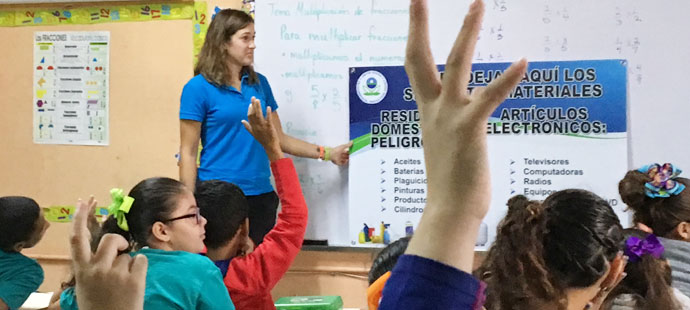Amanda Miles graduated from St. Norbert College in DePere Wisconsin, in 2013 with a bachelor’s degree in Spanish and Communications. During her time at Norbert, she worked in various roles, tutoring her fellow students in Spanish, and acting as office assistant to multiple departments. She also put in time with Literacy Green Bay, teaching English as a Second Language (ESL) to a group of adults. After graduation she worked for Premier Disability Services, LLC, as a case manager within the Spanish-speaking community of Minneapolis.
Amanda’s various jobs and activities all sprang from a desire to help people, and to use her degree. She chose that degree specifically to help her make a difference, help people to improve their lives, and to experience foreign cultures. She had always been heavily involved in volunteer work, from organizing 5K races to raising money for the American Cancer Society, to organizing youth in her community to volunteer with Habitat for Humanity. She also spent time in the international department of her school helping foreign students learn the English language and culture. That in turn encouraged her to learn about foreign cultures. With this cocktail of interests, it came as a natural progression for her to join the Peace Corps.
Established in 1961, the Peace Corps is a volunteer program run by the U.S. Government. They bring aid and technical assistance to foreign countries and help promote understanding of the American culture, and working to help Americans understand foreign cultures.
Amanda was with the Peace Corps for a little over a year, from June 2014 to August 2015, and it fulfilled all of her desires and expectations. She was deployed on the island of Saint Lucia in the West Indies, where she lived in a village on the northwest part of the island, teaching English Literacy to children in the second and third grades. Although the official language of the island is English, the villagers spoke French Creole, and Amanda learned some of the language during her time there.
A term often spoken about is the “cycle of poverty.” With any kind of volunteer work there is “cycle-perpetuating” aid, and “cycle-breaking” aid. It’s the classical difference between giving a man a fish and teaching him to fish. The work that Amanda did was cycle-breaking, and part of the program was to help local teachers learn best teaching practices. Amanda was never alone during her classes, but was always accompanied by a local teacher. The goal was not only to teach the current students to be literate in English, but to leave the school able to operate more effectively without outside assistance. Another component of this was the establishment of a school library. Amanda also started a Spanish class, taught swimming, and helped coach running.
Upon leaving the Peace Corps Amanda spent a year in Athens, Greece with Lexi-Logos Language School. There she studied Modern Greek at an elementary level, and privately taught English to locals and foreign visitors. Whilst in Greece, she embarked on a 150 hour online course in International TEFL and TESOL Training, which certified her to teach English as a second language.
Upon returning home, Amanda spent four months working with the YMCA in Maplewood, Minnesota, promoting healthy living and social responsibility to members.
Peace Corps volunteers are given the opportunity to apply for federal jobs for a year after leaving. Amanda knew that she wanted to work for the federal government, and she also wanted to use her Spanish and work on community outreach. The Environmental Protection Agency (EPA) provided the perfect solution.
She began working for the EPA in January 2017, and hasn’t looked back. She moved to Philadelphia, and became a Community Involvement Coordinator. She now works within the Community Involvement and Outreach branch of the EPA, working on media relations, conflict management, and risk communication. The work is especially rewarding for Amanda because much of her time has been spent interacting with diverse communities. The EPA allows her to continue to serve these communities, and also provides the opportunity to give back to the local community through education and emergency response work.
Although her position at the EPA does not typically involve work in foreign countries, the situation in Puerto Rico after hurricanes Maria and Irma demanded lengthy deployments, and Amanda’s language skills made her ideal for the task. She has done a series of three deployments to the island, each two to three weeks in duration. This work involved the collection of hazardous waste, such as chemicals and electronics, to ensure that they didn’t wind up in a landfill. The experience has been especially interesting, because Amanda has many Hispanic co-workers, and experiencing the island with them was something truly special.
In the fall semester of 2017, Amanda began attending Rutgers–Camden in pursuit of a master’s degree in Public Policy and Administration (MPA). She chose Rutgers–Camden because of the flexibility within the program. It allows specializations, and she is able to continue working while pursing the degree. She’s decided on a specialization in Community Development. This specialization teaches students the domestic and international aspects of power, policy, advocacy, and resource allocation, preparing them for work in urban administration. This links directly into Amanda’s work with the EPA.
Due to her work, she can only attend school part-time, but she described her advisors as being “very responsive and encouraging” and anticipates graduating in about three years. Her goal in pursuing this additional degree is to become more useful in her current position with the EPA. It will also help her career prospects within the Agency, allowing room to move between departments and to advance.
Written by Victoria Wroblewski

